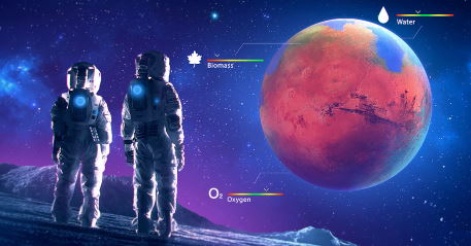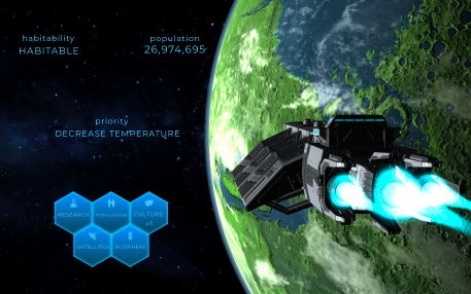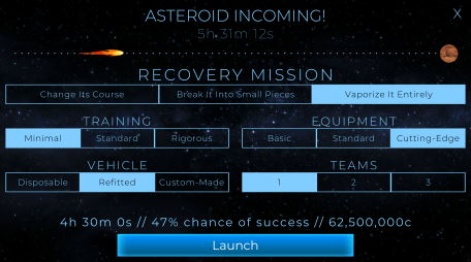At the moment it feels like many of us would rather be anywhere but planet Earth. Games provide an obvious chance to retreat to other worlds. Some gamers hunger for fantasy, but for those who enjoy a spoonful of realism mixed in with their escapism soup, TerraGenesis is the go-to.
Launched in 2017 by indie outfit Edgeworks, it's grown steadily in reputation across its five major updates, not least because of the real NASA data it uses to populate the planets you can visit.
Co-founder and lead developer Alexander Winn was due to speak about the game and about the nature of realism in game narratives at GDC this month. But with the conference postponed, so was his talk.
Instead, PocketGamer.biz grabbed him for a Skype call from his home office to find out what GDC would have held for the indie darling this year.
PG.biz: If we were at GDC this week, you'd be speaking about realism in game design. Can you give us a flavour of that?
Alexander Winn: One of the things that's been really interesting about TerraGenesis is that the game is based very heavily on real science. We use real maps from NASA for all the different planets in the game.
We use real planetary stats. Everything in the game is built to realistically depict how terraforming would work. Players really respond to that. They really get into the fact this isn’t just a generic red planet – this is Mars. This is what Mars looks like.
And I trace that back into other games. Obviously Kerbal Space Program derives a big part of its appeal from the fact that it's based on real science. And then even things like Assassin's Creed.
Obviously you can play an Assassin's Creed game just be in it for the fighting. But a lot of players enjoy Assassin's Creed because they want to visit Revolutionary France, or Renaissance Italy. And they really value the accuracy, "oh, I actually want to walk through what Rome was really like."

The talk that I was going to give at GDC was about this idea of using accuracy and realism to attract new audiences. If you roll out a new Halo game, you're going to get all the Halo players. But if you roll out a new Assassin's Creed game, you can actually draw in new audiences because they're interested in Ancient Greece.
This might be their first videogame ever! The rumour is that the next Assassin's Creed game is going to be set in the Viking age. I imagine a ton of players are going to come in because they're interested in Vikings.
We have a huge number of players of TerraGenesis for whom this is their first videogame ever. They have never played another game, but they love space. This has been a huge benefit to us.
The top two Facebook interest categories right now, when we are targeting TerraGenesis’s UA campaigns, are space and science – not mobile games, not "payers in videogames" or anything like that. It's just people who like space and science.
This is their first game ever. We are targeting people who like space and scienceAlexander Winn
So that was going to be my talk – how indie developers can leverage this to find new audiences by building in detail and realism into their game.
As a developer, how do you balance realism with the need to make it an entertaining game? At some point, a game is not real.
There are several strategies that you can take that allow you to inject realism into game design.
Personally, my favourite is what I’ve started calling "treating facts as Easter eggs". When you watch a Marvel movie, it's often the first movie that has ever been made about this character – Doctor Strange, or whatever. But the character has been around for 50 years. So when they make these movies, they pepper in so many Easter eggs.
The guy who was driving the cab in that scene is actually a character from the comics. In the latest Spider-Man movie, there’s a car that he fights behind and uses as cover. And if you look at the license plate, it's "ASM1961" or whatever – which stands for Amazing Spider-Man 1961, which was the first Spider-Man comic ever.
There are all of these things that they put in that affect the story not at all. They're just there for the fans of Spider-Man or the fans of Doctor Strange to get a little extra delight from.

One of the things that we did in TerraGenesis is: every planet – Mercury, Earth, Mars, all the moons – they all rotate in the same direction except for Venus, which rotates backwards. We actually get bug reports, periodically, from players who say, "just so you know, Venus is going the wrong way." Except that Venus really does rotate the wrong way. That’s a thing that is real in real life!
It doesn't change the gameplay at all, but it just makes it a little cooler. It's the same with the planet maps. We could have gotten away with using a generic red landscape from Mars. If anything, it probably would have been easier, because we could generate it at a higher resolution. But the fact that we're using a real map of Mars makes it so much cooler.
The real science of it all is not presented as real science, to be perfectly honest. We never actually point to the map of Mars and go, "this is really the map of Mars! Isn't that cool?!”
You could theoretically play this game, and not actually realise how much real science there is in itAlexander Winn
You could theoretically play this game, and not actually realise how much real science there is in it. Just like you could play an Assassin's Creed game and not actually release that the characters you're talking to are historical figures. And that reduces the barrier to entry a little bit.
At last year's GDC you were about to release the version 5.0 update. A year has passed. How has the game evolved in the meantime?
The big thing that we've been rolling out recently has been helping to fix what might have been my biggest kind of problem with TerraGenesis. You know, I made TerraGenesis all by myself originally, in my spare time. Luckily, it's been successful enough that my wife and I have been able to build a company around it.
And so now we have a team. We have other developers and we have marketing people and all sorts of stuff. And through our publisher, we have access to artists and other sort of content creators that can help out. But because I made the original version all by myself, it's very text-based.
I'm not an artist. I was an app developer, not really a game developer, before I made TerraGenesis. So I'm very familiar with how to make tables and menus and buttons and that sort of thing. And so the original version of TerraGenesis was basically a really good-looking planet, and then a whole lot of text and numbers.
Ever since it has taken off, it's been my ambition to add more character, and add more art, and add more content to engage people that is a little bit less dry than numbers and text.
So we've been doing that over time. In 5.0, we added tutorial characters for each faction, so that there's one character that's the avatar of each ideological faction. And we added some character interactions and some storylines.

In TerraGenesis 5.2, we rolled out a new system called Governors. And this has been a huge effort. We've been working on it for about eight months, where we've added 43 new characters, and these are individual characters. You can see their face. You can read their bio. Each one of them has different effects.
It's all sort of a Pokémon experience. You can collect these Governors, and you can level them up. And then you can use them in different ways to give you different bonuses. Which, from a gameplay standpoint, is nice, because it increases gameplay variety, and it allows you to get that collection mechanic that can be a lot of fun.
But it also allows us to expand on the lore of TerraGenesis, the backstory. And allows us to give people a little bit more of a flavour for who these factions are, and what has happened over the course of the universe of TerraGenesis.
That has been a lot of fun. We've gotten some really good feedback from the players who really get into these characters and backstory (it’ll say, "this guy was General Secretary of the UN during the Sundering." And then it'll just move on. Players will be like, "what was the Sundering?!"). So that's been a lot of fun.
And we're hoping to roll out more Governors in the future, and to continue expanding out this functionality to give a little more character to the world.
By making it part of the gameplay experience, all of a sudden players love our adsAlexander Winn
Are there any other lessons that you've learned, or observations you've made about players in the time you've been running the game?
Firstly, the value of deep engagement with the players. You know, every single day, I am in the Facebook fan group. I'm on Reddit. I'm on Twitter. And I'm talking to the players.
We’re very transparent with the players. When a bug happens in one of our updates, we will post what the bug is, and why did that bug happen. And not only does that really help with marketing, that you're out there pounding the pavement, but it also builds this huge store of goodwill among players. And so now, on the rare occasions that there is a bug, we have almost this volunteer QA team that will spring into action.
I'm not exaggerating – we'd had five-star reviews from players who could not even launch the game. They could not launch the game, and they still gave us a five-star review, because we responded to them, and we talked it through, and we asked for details. We just made them feel really seen and helped. They feel like they're on the team – because they are!
And secondly, another thing I've learned is the difference between good and bad monetisation. And by extension, good and bad game design. It's not about what you do, it's about how you do it.
Some players often talk about how annoying it is when there are ads in games. Well, when our ads stop working, we actually get complaints, because people can't watch the ads! The two or three times that the ad system has gone down, players complain that they're missing out on the ads.
And it's because we integrated the ads into the gameplay experience. It's not just an interstitial that appears and gets in your way and annoys you. You actually get a thing that says, "incoming transmission" – and when you open it, it says, "we've picked up an incoming transmission from a ship en route. If you watch it, we're expecting that blah blah blah will happen." And we give them an option to decline – but we also give them an option to watch it, and get some bonus.
You know, they're rewarded videos. But they're grounded in the story of the game. By making it more a part of the gameplay experience, all of a sudden players love our ads. They hugely appreciate the fact that they get these bonuses, and that it doesn’t break the experience for them.
And that has been really interesting to me, because even today, I look at other games that are doing the same things we are, but they're not taking the time to do them well, and they're getting in trouble for it. And meanwhile, our players celebrate when we roll out new monetisation systems, which is great, because they want to support us, and we want to make sure that the gameplay experience is still fun and cohesive.
Thanks, Alexander.
TerraGenesis is developed by Edgeworks and published by Tilting Point. It won our own Very Big Indie Pitch in San Francisco in 2017, and now it has just been released on Steam as well. You can read a little more about that version on our partner site PC Games Insider.























